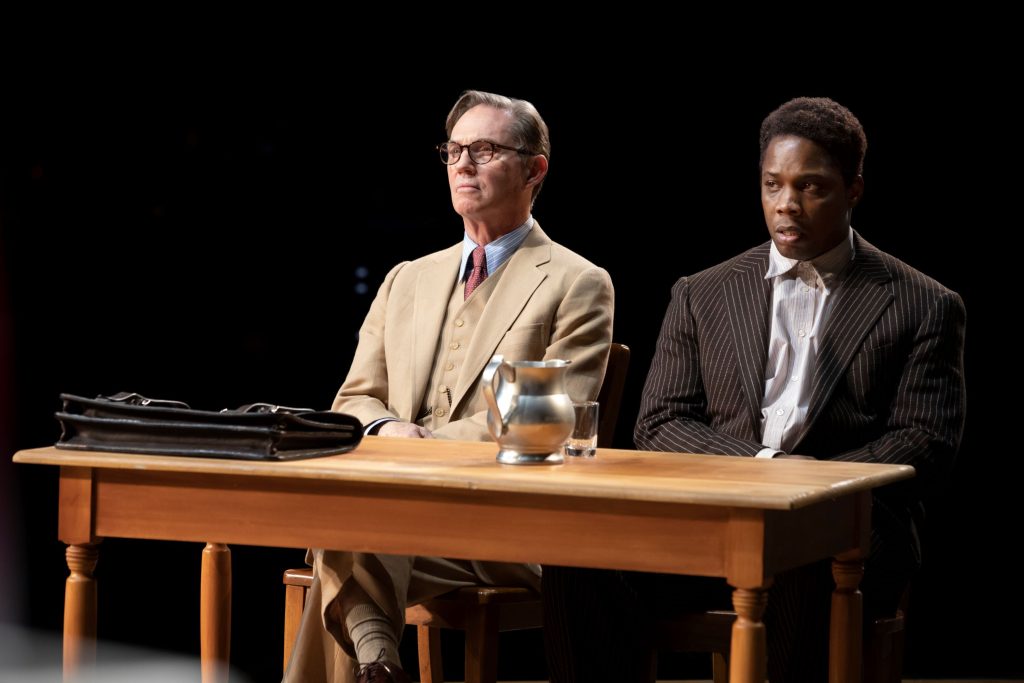
PPAC brings to the stage Harper Lee’s beloved novel To Kill a Mockingbird, which holds the record as the highest–grossing American play in Broadway history. This new play by Aaron Sorkin is expertly directed by Bartlett Sher. It is said it’s a sin to kill a mockingbird, as they are innocent. And there you have it—an innocent Black man is facing the death sentence, accused of raping a White girl in the Alabama in of 1934. The Civil War has been over for 70 years, but not really.
Richard Thomas gives an incredible performance as lead man, Atticus Finch. Thomas is best known for his portrayal of John-Boy on the 1970’s TV show “The Waltons,” which earned him an Emmy. His respected character has been updated under the direction of Sher. Unlike the beloved book character, this Atticus has a sense of humor. Yes, the production is often funny! This is a welcome reprieve from the solemn tone of the novel, and in no way undermines the subject matter. Using a modern take, we see old themes imparted with current wisdom—and the audience can’t help but react each time these points pierce. Thomas is a force to be reckoned with whether as lawyer, neighbor, or father—an absolute pleasure to watch, especially when he drives it all home. Good night, Atticus! (Sorry, couldn’t help it.!)
“Bart took Atticus off the pedestal,” Thomas says of Sher’s interpretation in a recent interview. “In the movie version, Atticus is less approachable and more idealized. But he has a life off the page.” As to the humor aspect, Thomas says, “It’s funnier than people expect, which is great. It’s our job to disabuse people of the preconceptions they bring into the theater. I could not be more physically and vocally different than Greg Peck, and that’s a good thing. People should watch and forget those preconceptions. People expect relentlessly serious. The key is balance.”
All the performers are excellent, and especially noteworthy is Jacqueline Williams, who portrays Calpurnia, a Black domestic helper working for Atticus. Since the matriarch of the Finch family has passed, Calpurnia also serves as governess, and the voice of reason. She may not have many lines before intermission, but Williams bears a strong presence throughout, and packs a powerful punch when she does speak.
Yaegel T. Welch as the accused Tom Robinson is phenomenal. He plays his part so realistically, you shudder as he pleads his case, much to Atticus’s chagrin. His stature and booming voice are larger than life, which speaks volumes consideringconsider it’s hisTom’s life on the line.
The three ‘children’ narrating the production skip around the stage energetically, sometimes childish and comical, sometimes serious and scared. Traditionalists may be distracted by seeing Scout Finch (Scout Backus), Jem Finch (Justin Mark), and Dill Harris (Steven Lee Johnson) looking like adults as they dress and act like adolescents playing their roles and also narrating throughout the production. Give them a chance, though, as audiences love their playfulness, informative guidance and comic relief.
Mary Badham, who portrayed Scout in the 1962 film To Kill a Mockingbird, a performance which earned her an Oscar nomination for her performance at age 10, is part of the national tour cast. She portrays the prejudiced Mrs. Henry Dubose.
Costume Designer Ann Roth captures the feel of the times in this Depression-era southern town. Scenic Designer Miriam Buether gives us an interesting quick change of settings that go between Atticus’s home and the courthouse, with a few extras here and there. Structures float up or down in the background as we watch the characters transition as well. Lighting Designer Jennifer Tipton also had lights artfully gliding in and out, depending on whether the scene calls for daylight, night sky or inside the courtroom.
The production feels a bit too long, and might have closed with a more compelling ending had the last 15 minutes been omitted, but has a powerful impact all the same. This is well worth your time! The production runs about three hours, including a 15-minute intermission.
PPAC presents To Kill a Mockingbird through February 11. For more info, visit ppacri.org or call 421-ARTS.